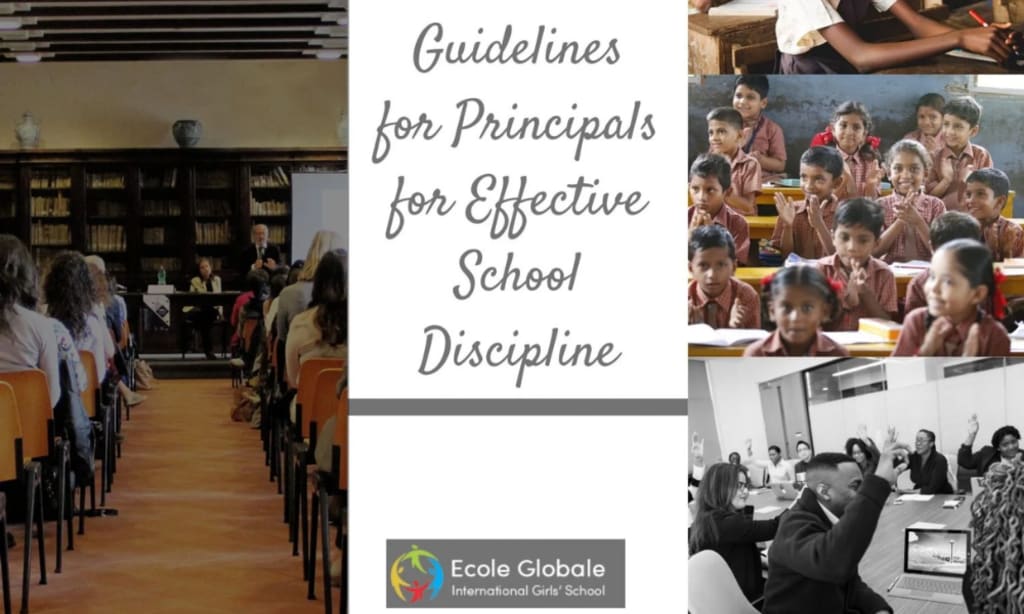Guidelines for Principals for Effective School Discipline
School Discipline

A significant portion of the time is spent addressing student behavior and school discipline by administrators. To eliminate discipline-related problems, there is no fast track. However, for more effective and efficient school policies, there are a few steps that you can follow.
Discipline is crucial in student life. The most important factor is to identify yourself and your staff with the school’s vision and mission to run the school successfully. You should work towards creating a more proactive and positive environment, thus transforming your school’s culture and also focus on enforcing specific behavioral rules and consequences. To promote a positive environment in the school and to deter poor choices and bad student behavior, the administration can do several things.
To reduce all discipline-related issues and to establish effective school discipline, the following guidelines are provided to assist principals. These steps help create a more efficient and fluid discipline process. Principals should also take into account that every student is different, and variations are needed in each situation.
1. Create a Plan for Teachers to Follow
Clearly Define Expectations: Teachers should know your expectations regarding student discipline and classroom management. This includes setting clear guidelines on what behaviors are acceptable and what actions should be taken in response to various infractions.
Classroom vs. Office Issues: Specify which situations teachers should handle in the class and which should be brought to the office. For example, minor disruptions might be managed by the teacher, while more severe issues, such as fighting or repeated defiance, might require administrative intervention.
Consequences and Discipline Referral Forms: Provide acceptable consequences for student discipline problems. If a discipline referral form is required, explain what information should be included and how to fill it out. Detailed forms help maintain consistency and provide a record for future reference.
Action Plan for Major Issues: Have a definite plan to handle major discipline issues to ensure smooth and efficient school operation. This might include step-by-step procedures for addressing severe behavioral problems or emergencies.
2. Support the Teachers
Build Trust: Establish trust with the teachers and make them feel supported to enable better communication. Teachers should feel confident that the administration will back them up when they enforce school rules.
Address Teacher Concerns: Handle situations where teachers abuse the discipline process by sending students to the office for minor issues. Offer constructive feedback and provide strategies for managing such situations within the classroom.
Provide Guidance: If a teacher sends too many referrals, guide them on the expected plan and what they are currently following. This helps ensure that disciplinary measures are used appropriately and effectively.
3. Be Consistent and Fair
Earn Respect: Earn respect by being consistent and fair in discipline decisions. Consistency helps students understand the consequences of their actions and builds trust in the fairness of the administration.
Similar Punishments for Similar Offenses: Apply similar punishments for similar offenses but adjust consequences based on the student’s history of discipline issues. This approach balances fairness with the need to address chronic behavior problems more severely.
4. Documentation
Keep Detailed Records: Document issues during the entire discipline process, including the student’s name, referring teacher’s name, reason for referral, time of day, location, and actions taken. Detailed records provide a clear account of incidents and responses.
Legal Protection: Documentation helps protect you and the involved teacher if the case ever leads to legal action. Accurate records can demonstrate that proper procedures were followed.
Identify Patterns: Use documentation to track and correct discipline problems, identify patterns, and make necessary adjustments. For example, if certain behaviors are more common at specific times of day, you can implement targeted interventions.
5. Be Calm, But Be Stern
Manage Stress: Handle situations where teachers send students to the office out of frustration. Teachers often deal with high-stress situations and may need support in managing their reactions.
Calm Down Period: Allow students time to calm down when they come to the office and sense their anger. A few minutes of cooling off can prevent further escalation and make it easier to discuss the issue rationally.
Maintain Authority: Ensure students understand your duty to discipline them and maintain authority while being fair. It’s important to be firm and clear about expectations and consequences without being overly harsh.
6. Know Your District Policies and Pertinent State Laws
Follow Guidelines: Always act within the guidelines of your school district’s policies and procedures. Familiarize yourself with these policies to ensure compliance and avoid potential issues.
Understand Legal Requirements: For issues like suspension or search and seizure, check pertinent state laws. Legal requirements can vary significantly, and it’s crucial to stay informed.
Seek Advice When Needed: Consult another administrator or district attorney if you are unsure about a situation to avoid legal repercussions. It’s better to seek guidance than to make a decision that could lead to legal challenges.
Conclusion
Implementing effective school discipline is a multifaceted task that requires a clear plan, support for teachers, consistency, thorough documentation, a calm but authoritative demeanor, and adherence to district policies and state laws. By following these guidelines, principals can create a positive school environment where students understand the expectations and consequences of their actions. This proactive approach not only addresses behavioral issues but also fosters a culture of respect and responsibility within the school community. Effective discipline is not just about managing misbehavior but about guiding students towards making better choices and contributing to a safe and conducive learning environment.
For more info....https://www.ecoleglobale.com/blog/children-use-smartphones-without-parental-advice/
Frequently asked question
Q1: What is the importance of discipline in school?
Answer- Discipline in school is crucial for creating a positive learning environment, ensuring student safety, and fostering respect and responsibility among students.
Q2: How can principals support teachers in maintaining discipline in school?
Answer- Principals can support teachers by providing clear guidelines, offering constructive feedback, and ensuring that teachers feel backed by the administration.
Q3: Why is documentation important in maintaining discipline in school?
Answer- Documentation helps track behavior patterns, provides legal protection, and ensures consistency and fairness in handling discipline issues.
Q4: How can schools ensure consistency in discipline?
Answer- Schools can ensure consistency by applying similar punishments for similar offenses, taking the student's history into account, and following a clear discipline plan.
Q5: What role does effective communication play in maintaining discipline in school?
Answer- Effective communication builds trust between teachers and administration, ensures clarity of expectations, and helps address discipline issues proactively.
About the Creator
Enjoyed the story? Support the Creator.
Subscribe for free to receive all their stories in your feed. You could also pledge your support or give them a one-off tip, letting them know you appreciate their work.





Comments
There are no comments for this story
Be the first to respond and start the conversation.